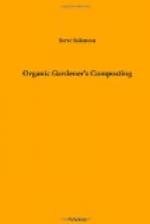Kuhnelt, Wilhelm. Soil Biology: with special reference to the animal kingdom. East Lansing: Michigan State University Press, 1976. Soil zoology at a level assuming readers have university-level biology, zoology and microbiology. Still, very interesting to well-read lay persons who are not intimidated by Latin taxonomy.
Minnich, Jerry. The Earthworm Book: How to Raise and Use Earthworms for Your Farm and Garden. Emmaus: Rodale Press, 1977. This book is a thorough and encyclopedic survey of the subject
Minnich, Jerry and Marjorie Hunt. The Rodale Guide to Composting. Emmaus, Pennsylvania: Rodale Press, 1979. A very complete survey of composting at home, on the farm, and in municipalities. The book has been through numerous rewritings since the first edition; this version is the best. It is more cohesive and less seeming like it was written by a committee than the version in print now. Organic Gardening and Farming magazine may have been at its best when Minnich was a senior editor.
Oliver, George Sheffield. Our Friend the Earthworm. Library no. 26. Emmaus: Rodale Press, 1945. During the 1940s Rodale Press issued an inexpensive pamphlet library; this is one of the series.
Pfeiffer, E.E. Biodynamic Farming and Gardening. Spring Valley, New York: Anthroposophic Press, 1938.
Poincelot, R.P. The Biochemistry and Methodology of Composting. Vol. Bull. 727. Conn. Agric. Expt. Sta., 1972. A rigorous but readable review of scientific literature and known data on composting through 1972 including a complete bibliography.
Russell, Sir E. John. Soil Conditions and Plant Growth. Eighth Ed., New York: Longmans, Green & Co., 1950. The best soil science text I know of. Avoid the recent in-print edition that has been revised by a committee of current British agronomists. They enlarged Russell’s book and made more credible to academics by making it less comprehensible to ordinary people with good education and intelligence through the introduction of unnecessary mathematical models and stilted prose. it lacks the human touch and simpler explanations of Russell’s original statements.
Schaller, Friedrich. Soil Animals. Ann Arbor: University of Michigan, 1968. Soil zoology for American readers without extensive scientific background. Shaler was Kuhnelt’s student.
Stout, Ruth. Gardening Without Work: For the Aging, the Busy and the Indolent. Old Greenwich, Connecticut: Devin Adair, 1961. The original statement of mulch gardening. Fun to read. Her disciple, Richard Clemence, wrote several books in the late 1970s that develop the method further.
Of interest to the serious food gardener
I have learned far more from my own self-directed studies than my formal education. From time to time I get enthusiastic about some topic and voraciously read about it. When I started gardening in the early 1970s l quickly devoured everything labeled “organic” in the local public library and began what became a ten-year subscription to Organic Gardening and Farming magazine. During the early 1980s the garden books that I wrote all had the word “organic” in the title.




